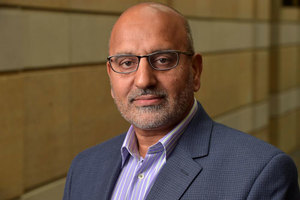 Ebrahim Moosa
Ebrahim Moosa
(Click for larger image)
Jordan’s King Abdullah has promised revenge on the Islamic State (IS), following a video released Tuesday (Feb. 3) that shows a Jordanian air force pilot being burned alive in a locked cage by IS fighters.
Jordan, however, should not strive to imitate the Islamic State’s barbaric actions, no matter how justified its outrage, according to Ebrahim Moosa, professor of Islamic studies in the University of Notre Dame’s Kroc Institute for International Peace Studies.
“King Abdulla and the coalition against the Islamic State should not fall into the trap of their adversaries,” says Moosa. “Not only do Jordan and the coalition lose moral high ground by responding to calls for vengeance, but it is Islamic State’s strategy to invite coalition ground forces into a quagmire in their territories in Iraq and Syria.”
Moosa says vengeance is bad strategy with harmful long-term consequences.
“Already the anti-IS coalition is cracking,” he says. “The United Arab Emirates indicated that it is suspending flights over IS territory. The anti-IS coalition should not repeat the mistakes committed by the U.S. during the invasion and occupation of Iraq when it caused the deaths of tens of thousands of civilians. To get to IS fighters, the coalition forces will have to inflict heavy casualties on civilians in densely occupied cities and towns. That is no solution.”
Moosa recommends a more systematic approach to isolate the IS leadership in Raqqa and in their refuges in Iraq and Syria.
“Using rehabilitated and formerly radical salafi religious scholars (ulama) in the Gulf region, especially from Saudi Arabia and Iraq, to engage in religious dialogue with tribal and religious leaders in IS territories would be a more constructive step toward a diplomatic solution to the problem of IS,” Moosa says. “There is no military solution to IS. Afghanistan should be a salient lesson to U.S. strategists and policymakers that even ground forces cannot clear the Taliban from the battlefield. The only way forward is to advance democratic options in the region, a goal most Gulf regimes are vehemently opposed to as they have eagerly smothered emerging democracies in Egypt and Bahrain. Only when real alternatives are available for the people of Iraq and Syria will the attraction of IS evaporate in both the region and for their sympathizers elsewhere."
Author of “Islam in the Modern World,” Moosa specializes in Islamic thought, with a focus on Islamic law, ethics, history and theology. He co-directs Contending Modernities, Notre Dame’s global research and education initiative examining the interaction among Catholic, Muslim and other religious and secular forces in the world. His book “What is a Madrasa?” will be released in March.
Contact: Ebrahim Moosa, 574-631-1204, emoosa1@nd.edu